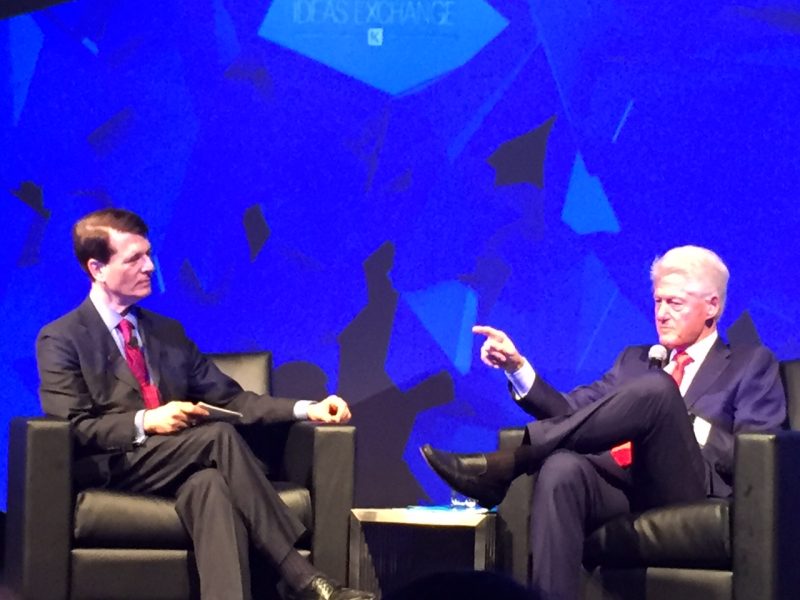Inside BIO: Ron Cohen, MD on leading through uncertainty and championing biotech’s Future

By Gil Bashe, chair global health and purpose, FINN Partners, Medika Life editor-in-chief, and correspondent to Health Tech World
This year’s BIO International Convention comes during heightened uncertainty, from shifting regulatory environments to tightened capital markets. In this landscape, the importance of convening as a sector is greater than ever.
As the global community converges in Boston, the founder-CEO-turned-industry advocate shares what’s at stake for biotech leaders at BIO 2025 and why now is the moment to plan, partner, and push forward.
Dr Ron Cohen is a past chair of BIO and has long stood at the intersection of science, policy, and purpose.
Looking toward this conversation, he reflects on his multi-year efforts championing emerging companies and the larger BIO community.
Dr. Cohen has been active in the biotechnology sector for nearly 40 years.
He began his biotech career in the mid-1980s at Advanced Tissue Sciences, a company focused on tissue engineering.
In 1995, he founded Acorda Therapeutics, serving as President and CEO until 2024.
Throughout his career, Dr Cohen has been a prominent figure in the biotech industry, contributing to developing therapies for neurological disorders and serving in leadership roles within industry organisations.
Join Health Tech World for this exclusive interview.
Ron, you’ve held leadership roles from corporate CEO to BIO Chair. When you were invited to take on the chair role, what did that mean to you and the biotech community?
Ron Cohen, MD:
It was incredibly meaningful to be chosen as Chair of BIO.
Having worked my way up from early involvement in the New York biotech association to the BIO Board, I understood how vital it was to ensure emerging companies had a voice.
Serving as Chair was not just an honour—it was a responsibility.
It was a progression.
I started on the BIO Board around 2002 and became chair of the Emerging Companies Section, which gave voice to early-stage and pre-market companies.
I saw the biotech industry as representing some of humanity’s highest aspirations.
As a physician, the ability to contribute to better therapies spoke to why I wanted to become a physician and save lives.
BIO is the only large-scale platform that amplifies the aspirations of small and mid-sized companies, which are often the essential innovation engine of our industry.
These aren’t just companies; they’re missions in motion, focused on treating devastating diseases and improving lives.
My role was to ensure their stories, needs, and contributions were front and center in the national policy conversation.
Bashe:
You’ve represented BIO before Congress and the Administration. What was it like advocating for biotech innovation on Capitol Hill?
Cohen:
It was gratifying and frustrating to educate policymakers, who often lacked firsthand knowledge of our science. We came as experts, humanising the industry.
We weren’t ‘the evil empire.’ We were people solving humanity’s most urgent health problems.
Stepping into Congressional offices as the BIO representative meant becoming both an educator and an advocate.
Most policymakers do not understand how complex and high-risk it is to bring a new therapy to market.

Dr Cohen interviews former US President Bill Clinton
Our job was to make the human and economic case for supporting innovation.
We shared with members of Congress how breakthrough drugs save billions in long-term healthcare costs and, more importantly, change or save lives.
We also brought patients with us—real stories of people who were alive and thriving because of our industry’s work. That was transformative.
Being BIO Chair was a bridge between the bench scientist and the policymaker, the startup CEO and the Senator.
It was humbling and a privilege.
Bashe:
Let’s talk about the capital markets. You’ve noted a downturn in biotech investment. What’s changed, and what should companies understand?
Cohen:
The investment environment has shifted dramatically.
In 2021, during the pandemic, biotech experienced an unprecedented surge in venture funding—VCs saw both the urgency and potential of the sector.
But since then, there’s been a retreat, especially for early-stage companies.
Investors are risk-averse now, focusing on fewer companies but writing bigger checks. That leaves many brilliant, early-stage innovators without capital.
That leaves many early-stage innovators struggling for support. But overall, there is still a tremendous amount of capital accessible.
Companies need to understand that this isn’t just about numbers—it’s about narratives. You need to tell your story compellingly and clearly.
That’s why meetings like BIO are so crucial—they’re where you can reset perceptions, showcase your vision, and gain traction.
Bashe:
With BIO around the corner, how can emerging biotech companies make the most of the meeting?
Cohen:
Treat BIO like one of your most important investor meetings of the year.
It’s not just a trade show—it’s a strategic business accelerator. Prepare a compelling narrative.
Know your top ten targets—whether they’re potential investors, partners, or collaborators.
Research the panels. Know who’s speaking and where you must be to cross paths with the right people.
Come prepared. Treat BIO as a strategic initiative. Set goals, plan meetings, and study the agenda. Identify potential partners and buttonhole them after panels.
It’s about networking with purpose. Engage early and follow up.
The BIO One-on-One Partnering system is an incredible tool—use it fully and go beyond it. Arrange informal coffees, reach out directly.
This is your opportunity to put your science, your team, and your purpose in front of the people who can change your company’s future.
BIO gives you visibility you can’t get anywhere else—leverage it with intention.
Bashe:
And in this policy climate, with talk of “Most Favored Nation” pricing and import tariffs, what kinds of behind-the-scenes conversations are happening among CEOs?
Cohen:
These policy shifts are seismic. Most Favored Nation pricing and import tariffs on APIs aren’t abstract ideas.
They affect strategy, revenue forecasts, and whether a new product is launched in certain countries.
These aren’t easy decisions, and that’s why BIO is essential.
It’s a forum not just for public dialogue but also for private insight-sharing.
We compare notes, calibrate, and collaborate on advocacy responses.
It’s where the sector aligns its voice in uncertain times. Companies are being cautious, but yes, there’s conversation—privately and in panels—about how to navigate pricing pressure, trade policy, and global strategy.
BIO is a key place to learn and share perspectives.
Bashe:
You’re still very active as an advisor and even contemplating a return to the CEO seat. What kind of opportunity would draw you back?
Cohen:
I’m looking for a mission I can believe in—a scientific innovation with the potential to profoundly change patient outcomes.
I’ve built and led a public company through all the cycles—boom, bust, and beyond.
What excites me now is mentoring new teams, bringing decades of insight, and helping the next generation avoid avoidable mistakes.
Whether as CEO, board member, or advisor, I want to be part of a team that values purpose, science, and execution equally.
There’s a lot of noise in biotech. I’m drawn to companies that still remember why they started—to change lives.
I’m seeking a mission-driven company with innovative science and a team ready to execute. That’s where I can contribute most—bringing therapies to patients and helping a new generation of leaders succeed.
Bashe:
You mentioned the importance of planning ahead for BIO. What tactical steps should companies take in the months before the convention?
Cohen:
Start six months in advance. Reach out to your network—investors, collaborators, potential partners—and ask if they’ll be attending.
Schedule meetings. Familiarise yourself with the agenda and identify key sessions where your targets speak or attend.
Use BIO’s partnering system, and be proactive—send direct outreach emails. The more structured your approach, the more productive your week will be.
Bashe:
For CEOs who are new to BIO, what advice would you offer so they avoid being overwhelmed?
Cohen:
Don’t try to do it all. Focus on key objectives—securing financing, finding partners, and increasing visibility.
Stay flexible. Sometimes the most valuable conversations are spontaneous—a hallway meeting or a chat over coffee. Be present, but be strategic.
Bashe:
From a broader industry perspective, how has the role of BIO evolved over the years?
Cohen:
BIO started as an industry trade association but has evolved into a vital advocacy and educational platform. It’s one of the only places where science, policy, and business come together at scale.
The annual convention is a microcosm of global biotech—it reflects the challenges and possibilities.
It’s also where a lot of silent work happens—policy shaping, consensus building, and coalition formation.
Photo: Dr Cohen moderating the “Drug Pricing and Access ” at the R&D Leadership Summit 2024, with Senator Paul Hudson (Sanofi CEO). Bill Cassidy, John Crowley, BIO CEO, and Harvard Business School Healthcare economist, Amitabh Chandra.
Bashe:
You’ve spoken passionately about the moral imperative behind biotech. Could you expand on how your heritage and values inform your mission?
Cohen:
The Jewish concept of Tikkun Olam—repairing the world—is central to me.
As a physician and biotech executive, it has always guided my path.
Our goal isn’t just to make great products. It’s to reduce suffering.
Biotech isn’t just about molecules — it’s about moral responsibility to the people we serve.
It’s to leave behind a healthier and more humane world than we found it. That’s what drives me.
Bashe:
Some critics argue biotech has become too focused on profitability over patient impact.
How do you respond to that?
Cohen:
That’s a misperception rooted in the complexity of drug pricing and development.
It takes hundreds of millions, even billions, to bring a product to market.
Investors need a return, or the engine stops.
But most CEOs I know aren’t interested in getting rich. They’re in it because they believe their science can save lives.
We must better communicate that balance—profit is part of sustainability, but purpose is the soul of this work.
Bashe:
What are the biggest challenges for biotech leaders over the next five years?
Cohen:
Regulatory unpredictability, capital scarcity, and global competition are challenges, but there are opportunities: AI is accelerating discovery, gene editing is revolutionising treatment, and digital health is transforming care delivery.
Leaders must be nimble, ethically grounded, and constantly learning.
The next generation of biotech CEOs must be science-literate, policy-aware, and, above all, resilient.
Looking Toward Boston BIO
The Biotechnology Innovation Organization (BIO) stands as the leading voice for the global biotech industry, advocating for innovation, policy progress, and public-private partnerships that improve lives.
BIO represents more than 1,000 corporate members across 30 countries, and its annual BIO International Convention draws more than 15,000 biotech leaders from around the globe.
This year’s gathering will be led by BIO President and CEO John Crowley, a fellow biotech entrepreneur and former CEO who, like Dr Cohen, brings firsthand knowledge in launching and building life-sustaining companies.
As this community convenes, the influence of the BIO membership cannot be overstated. These are the voices that drive tomorrow’s breakthroughs.
Ron Cohen’s counsel to fellow biotech leaders is as pragmatic as it is principled: plan, connect, and advocate.
In a sector defined by discovery and resilience, BIO is more than a gathering—it’s a proving ground for what’s next.
Companies must listen and learn from one another. They must share strategies, forge collaborations, and reaffirm why this work matters.
BIO remains not only a forum for ideas—it is a foundation for action.
Dr Cohen’s insights are a call to biotech leaders: “Come ready to contribute, connect, and carry forward the mission of making health innovation accessible and impactful for all.”






